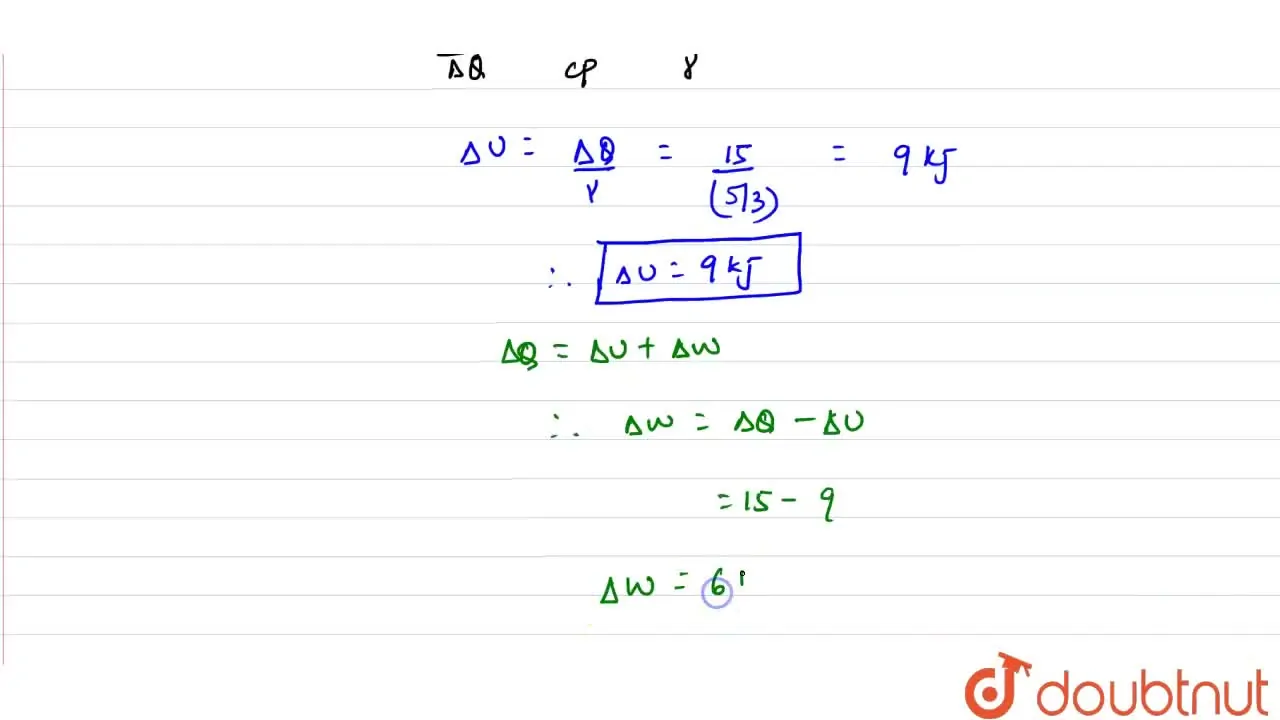A Vessel contains helium, which expands at constant pressure when 15 kJ of heat is supplied to it. What will be the variation of the internal energy of the gas? What is the work performed in the expansion?
The correct Answer is:9
Here (Given)
In an isobaric process
(always)
or
Related Playlists
- BOOK - CENGAGE PHYSICS ENGLISHCHAPTER - KINETIC THEORY OF GASES AND FIRST LAW OF THERMODYNAMICSEXERCISE - Comprehension56videos
KINETIC THEORY OF GASES AND FIRST LAW OF THERMODYNAMICS
- BOOK - CENGAGE PHYSICS ENGLISHCHAPTER - KINETIC THEORY OF GASESEXERCISE - Compression2videos
KINETIC THEORY OF GASES
- BOOK - CENGAGE PHYSICS ENGLISHCHAPTER - LINEAR AND ANGULAR SIMPLE HARMONIC MOTIONEXERCISE - Single correct anwer type14videos
LINEAR AND ANGULAR SIMPLE HARMONIC MOTION
Similar Questions
A monatomic gas expands at constant pressure on heating. The percentage of heat supplied that increases the internal energy of the gas and that is involed in the expansion is
View SolutionA monatomic gas expands at constant pressure on heating. The percentage of heat supplied that increases the internal energy of the gas and that is involed in the expansion is
View SolutionA vessel contains an ideal monoatomic gas which expands at constant pressure, when heat Q is given to it. Then the work done in expansion is
View SolutionA diatomic gas is heated at constant pressure. If 105J of heat is given to the gas, find (a) the change in internal energy of the gas (b) the work done by the gas.
View SolutionThe work done by a system is 8 Joule, when 40 joule heat is supplied to it .What is the increase in internal energy of the system?
View SolutionThe work done by the system is 8 joule, when 40 joule heat is supplied to it. What is the increases in internal energy of system.
View SolutionWhen an ideal diatomic gas is heated at constant pressure, the fraction of the heat energy supplied, which increases the internal energy of the gas, is
View SolutionWhen an ideal diatomic gas is heated at constant pressure, the fraction of the heat energy supplied, which increases the internal energy of the gas, is
View SolutionWhen an ideal diatomic gas is heated at constant pressure, the fraction of the heat energy supplied which increases the internal energy of the gas is
View SolutionWhen an ideal gas is heated at constant pressure, the fraction of the heat energy supplied whicn increases the internal energy of the gas is :
View Solution


